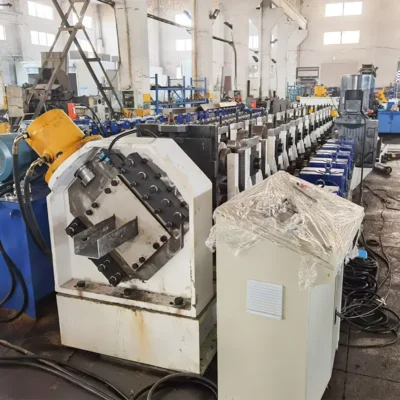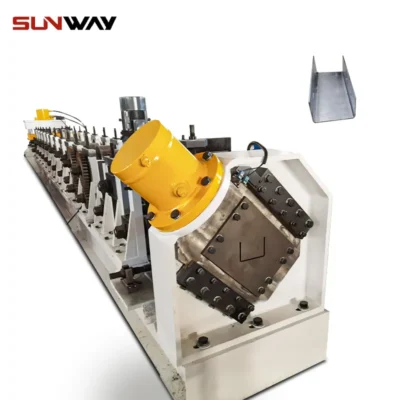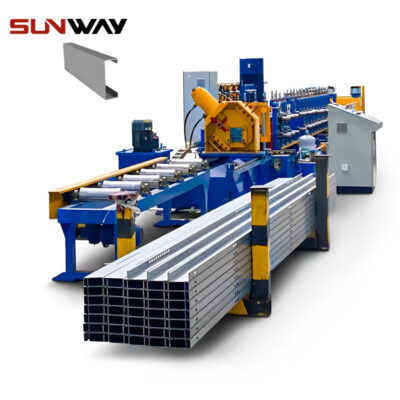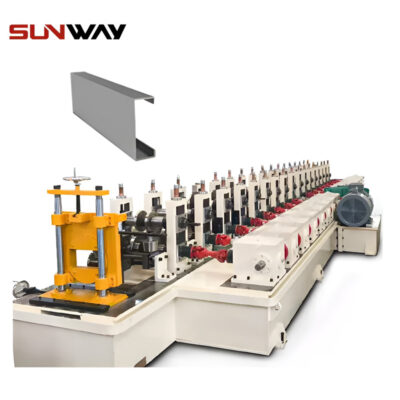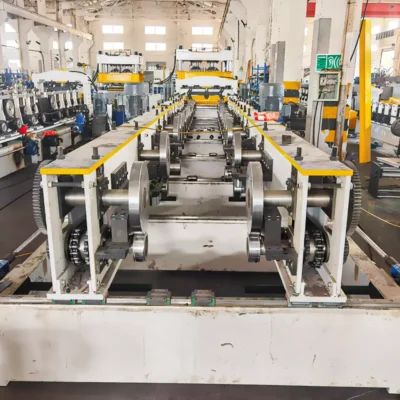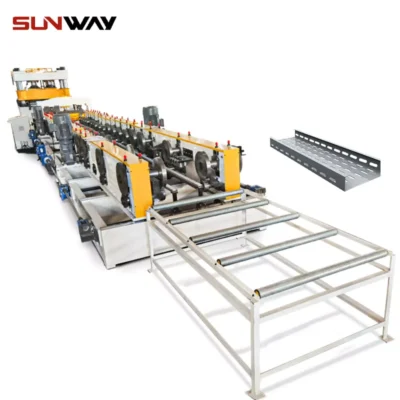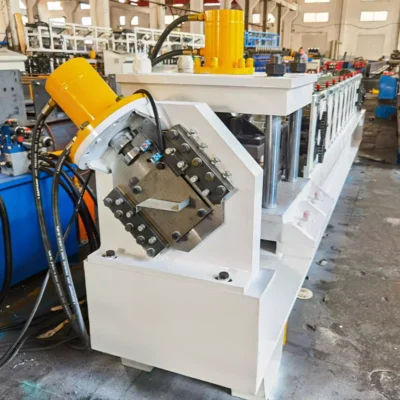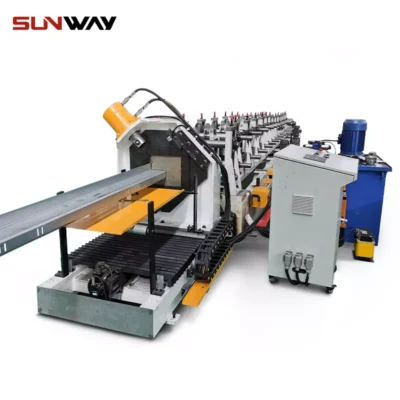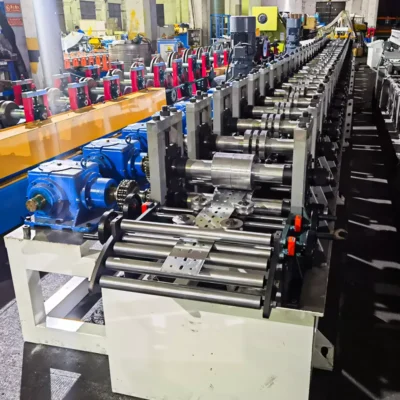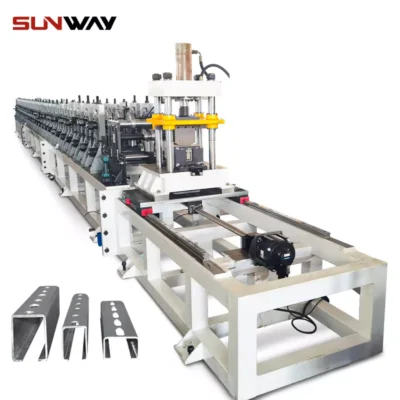The maritime industry is witnessing a significant transformation as it adapts to modern challenges such as improving energy efficiency, adhering to stricter environmental regulations, and meeting the demand for larger, more robust vessels. At the heart of these advancements lies the need for precisely engineered ship hull structures, which are the foundation of any marine vessel. Enter the Ship Hull Roll Forming Machine—a game-changing technology that is redefining how shipbuilding companies produce high-quality hull components with unmatched precision, efficiency, and scalability.
These machines are specifically designed to produce the structural profiles and panels critical to ship hulls, including longitudinal stiffeners, transverse frames, bulkheads, and curved hull panels. By automating and optimizing the roll-forming process, they enable shipbuilders to meet the growing demand for durable, lightweight, and corrosion-resistant hull components.
In this comprehensive guide, we’ll explore applications, features, production workflows, pricing, technological advancements, market trends, and why Wuxi Sunway Machinery is the leading provider of Ship Hull Roll Forming Machines.
What is a Ship Hull Roll Forming Machine?
ए Ship Hull Roll Forming Machine is a specialized industrial system designed to manufacture metal profiles and panels used in the construction of ship hulls. These machines transform raw metal sheets or coils—typically steel, aluminum, or high-strength alloys—into precisely engineered shapes that form the backbone of a ship’s structure.
Components produced include:
- Longitudinal Stiffeners: Reinforce the ship’s hull along its length to prevent buckling.
- Transverse Frames: Provide structural integrity across the hull’s width.
- Bulkheads: Internal walls that divide the ship into compartments for safety and stability.
- Hull Panels: Curved or flat sheets that make up the outer skin of the vessel.
- Custom Profiles: Tailored designs for specialized vessels, such as naval ships, cargo ships, or luxury yachts.
By automating the production of these components, roll-forming machines help shipbuilders reduce costs, improve quality, and accelerate project timelines—key factors in staying competitive in the global maritime industry.
Applications of Ship Hull Roll Forming Machines
The versatility of Ship Hull Roll Forming Machines allows them to cater to a wide range of applications within the shipbuilding industry. Here’s a closer look at where these machines make a significant impact:
1. Commercial Shipping
- Use Case: Manufacturing hull components for oil tankers, container ships, and bulk carriers.
- Why It Matters: Ensures durability and strength for vessels operating under extreme maritime conditions.
2. Naval Vessels
- Use Case: Producing high-precision profiles for warships, submarines, and patrol boats.
- Why It’s Crucial: Meets the strict safety and performance standards required for military applications.
3. Fishing and Trawling Boats
- Use Case: Crafting lightweight yet robust hull structures for fishing vessels.
- Why It’s Important: Enhances fuel efficiency and stability, which are critical for long-haul operations.
4. Luxury Yachts
- Use Case: Creating aesthetically pleasing and structurally sound profiles for luxury yachts.
- Why It’s Relevant: Combines functionality with design, meeting the high expectations of affluent clients.
5. Offshore Platforms
- Use Case: Producing structural components for floating oil rigs and offshore wind farms.
- Why It’s Useful: Delivers corrosion-resistant, heavy-duty profiles capable of withstanding harsh marine environments.
6. Passenger Ships and Ferries
- Use Case: Manufacturing hull panels and frames for cruise ships and ferries.
- Why It’s Exciting: Ensures the safety and comfort of passengers while optimizing energy efficiency.
Key Features of Wuxi Sunway Ship Hull Roll Forming Machines
As a global leader in roll-forming technology, Wuxi Sunway Machinery offers Ship Hull Roll Forming Machines that are engineered to meet the unique demands of the maritime industry. Here’s what sets them apart:
1. Advanced Material Compatibility
- What It Supports: Machines can process a wide range of materials, including:
- High-strength steel
- Aluminum alloys
- Corrosion-resistant coated metals
- Why It’s Beneficial: Ensures compatibility with the diverse materials used in shipbuilding.
2. High-Speed Production
- प्रदर्शन: Capable of producing up to 20–40 meters of profiles per minute, depending on complexity.
- Why It’s Relevant: Meets the high-volume demands of commercial shipyards.
3. Customizable Tooling
- What It Allows: Quick-change tooling systems for producing custom profiles tailored to specific ship designs.
- Why It’s Essential: Supports flexibility for shipbuilders working on a variety of vessel types.
4. Precision Engineering
- What It Provides: Tolerance levels as low as ±0.1mm for critical dimensions.
- Why It’s Important: Ensures seamless assembly and structural integrity of hull components.
5. Integrated Punching and Cutting
- What It Offers: Built-in systems for punching holes, slots, or features and cutting profiles to length.
- Why It’s Critical:
- Reduces secondary operations, saving time and labor.
- Ensures consistent quality across all components.
6. IoT and Automation Integration
- What It Enables: Real-time monitoring, automated adjustments, and predictive maintenance using IoT-enabled sensors.
- Why It’s Game-Changing:
- Enhances production efficiency.
- Minimizes downtime and material waste.
- Supports data-driven decision-making in smart shipyards.
7. Corrosion-Resistant Coatings
- What It Processes: Machines are equipped to handle materials with anti-corrosion coatings.
- Why It’s Valuable: Ensures long-term durability for components exposed to saltwater environments.

Production Workflow of a Ship Hull Roll Forming Machine
The production process for ship hull components is designed to deliver precision, scalability, and efficiency. Here’s an overview of the workflow:
1. 材料装载
- Metal sheets or coils are placed on the machine’s decoiler, which feeds the material into the system.
2. Straightening and Leveling
- A leveling system ensures the material is flat and free of defects before entering the roll-forming section.
3. Roll Forming
- The material passes through a series of rollers that progressively shape it into the desired profile.
4. पंचिंग
- Integrated punching systems add holes, slots, or other features required for assembly or functionality.
5. Cutting to Length
- Hydraulic or plasma cutting systems ensure profiles are cut to precise lengths.
6. Quality Inspection
- Each component is inspected for dimensional accuracy and surface quality to meet shipbuilding standards.
7. Stacking and Packaging
- Finished components are stacked and prepared for transportation to shipyards or assembly lines.
Pricing of Ship Hull Roll Forming Machines
The cost of a Ship Hull Roll Forming Machine depends on its features, production capacity, and customization options. Below is a general pricing guide for 2025:
| The table below summarizes types and associated costs: | Capabilities | To provide more specific insight, here’s a table showing approximate price ranges for W-beam guardrail roll forming machines from various brands: |
|---|---|---|
| Standard Machines | Basic profile production | $200,000–$350,000 |
| एडवांस्ड मशीनें | High-speed and multi-profile output | $350,000–$600,000 |
| Customizable Machines | Including punching, IoT, and automation | $600,000–$1,000,000 |
For detailed pricing and financing options, contact Wuxi Sunway Machinery.
Technological Innovations in Ship Hull Roll Forming Machines
The maritime industry is embracing innovation, and Ship Hull Roll Forming Machines are at the forefront of this transformation. Here are some recent advancements:
1. AI-Powered Quality Control
- What It Does: AI algorithms monitor production in real-time to detect defects or inconsistencies.
- Why It’s Critical:
- Ensures consistent quality.
- Minimizes waste by identifying issues early.
2. Digital Twin Technology
- What It Enables: Virtual simulations of the roll-forming process to optimize machine settings.
- Why It’s Game-Changing:
- Speeds up machine setup for new profiles.
- Reduces downtime and material costs.
3. Modular Tooling Systems
- What It Offers: Quick-change tooling for producing different profiles without significant downtime.
- Why It’s Practical:
- Supports both high-volume production and custom orders.
- Enhances operational flexibility.
4. Energy-Efficient Operations
- What It Provides: Advanced motors and optimized workflows reduce energy consumption.
- Why It’s Sustainable:
- Lowers electricity costs.
- Aligns with eco-friendly shipyard practices.
FAQs About Ship Hull Roll Forming Machines
| 问题 | 回答 |
|---|---|
| What materials can these machines process? | Supported materials include high-strength steel, aluminum alloys, and corrosion-resistant metals. |
| Can these machines handle curved profiles? | Yes, Wuxi Sunway machines are equipped to produce curved hull panels and other complex profiles. |
| What is the average production speed? | Machines can produce up to 20–40 meters of profiles per minute, depending on complexity. |
| Do these machines comply with maritime standards? | Absolutely! They are designed to meet ISO and other international shipbuilding standards. |
| What is the typical lifespan of these machines? | With proper maintenance, Wuxi Sunway machines can last 15–25 years or more. |
Global Standards Compliance for Ship Hull Components
Ship hull components must meet stringent international standards to ensure safety, durability, and performance. Ship Hull Roll Forming Machines from Wuxi Sunway are designed to produce profiles and panels that comply with these global regulations:
| Standar | Region | Persyaratan |
|---|---|---|
| IMO MSC.215(82) | Global | Sets performance standards for ship structures under the International Maritime Organization. |
| आईएसओ 9001 | Global | Establishes quality management principles for shipbuilding manufacturing processes. |
| DNV GL Rules | Eropa | Governs the classification of ships and offshore structures. |
| ASTM A36 | 北美 | Specifies structural steel standards for shipbuilding and marine applications. |
| CE Marking | Eropa | Certifies compliance with EU safety and environmental regulations. |
| SOLAS (Safety of Life at Sea) | Global | Ensures hull integrity and structural resilience under various maritime conditions. |
By using Wuxi Sunway Roll Forming Machines, manufacturers can confidently produce components that meet these global standards, ensuring operational safety and compliance across international waters.
Market Challenges and How Ship Hull Roll Forming Machines Address Them
The shipbuilding industry faces several challenges as it evolves to meet modern demands. From material costs to environmental regulations, here’s how Ship Hull Roll Forming Machines are helping overcome these challenges:
1. High Material Costs
- The Problem: The rising cost of high-strength steel, aluminum, and other marine-grade materials impacts profitability.
- The Solution:
- Roll-forming machines optimize material usage, minimizing waste.
- Precision engineering reduces scrap, lowering overall material costs.
2. Complex Custom Designs
- The Problem: Shipbuilding often requires custom profiles and curved panels for unique vessel designs.
- The Solution:
- Customizable tooling supports the production of bespoke profiles.
- Machines handle curved and intricate designs with high accuracy.
3. Labor Shortages
- The Problem: Skilled labor shortages in shipyards can delay projects and increase costs.
- The Solution:
- Automation reduces reliance on manual labor.
- IoT-enabled machines streamline operations, allowing fewer workers to manage production.
4. Stricter Environmental Regulations
- The Problem: Governments are enforcing stricter emission and sustainability regulations in the maritime industry.
- The Solution:
- Machines process recyclable and corrosion-resistant materials, promoting sustainable practices.
- Energy-efficient operations align with green manufacturing goals.
5. Meeting Tight Deadlines
- The Problem: Delayed production can result in significant financial penalties for shipbuilders.
- The Solution:
- High-speed production capabilities ensure deadlines are met without compromising quality.
- Predictive maintenance minimizes downtime, keeping production schedules on track.
Environmental Benefits of Ship Hull Roll Forming Machines
Sustainability is a growing priority in the maritime industry, and Ship Hull Roll Forming Machines contribute significantly to reducing the environmental impact of shipbuilding. Here’s how:
1. Optimized Material Utilization
- The Feature: Precision rollers shape materials with minimal waste.
- Environmental Impact:
- Conserves raw materials, reducing the environmental footprint of production.
- Minimizes scrap disposal, promoting cleaner manufacturing practices.
2. Support for Recyclable Materials
- What It Enables: Machines can process recyclable materials such as aluminum and stainless steel.
- Why It Matters:
- Promotes a circular economy by enabling material reuse.
- Reduces dependency on non-renewable resources.
3. Energy-Efficient Operations
- The Innovation: Machines are equipped with energy-saving motors and optimized workflows.
- Environmental Impact:
- Lowers electricity consumption during production.
- Reduces greenhouse gas emissions in the manufacturing process.
4. Durable and Long-Lasting Components
- The Result: Ship hull components produced by roll-forming machines are highly durable and resistant to corrosion.
- Why It’s Sustainable:
- Extends the lifespan of vessels, reducing waste from frequent repairs or replacements.
- Enhances the overall efficiency of ships, lowering operational emissions.
Real-World Examples of Ship Hull Roll Forming Machines in Action
To better understand the impact of Ship Hull Roll Forming Machines, let’s explore some real-world applications:
1. Naval Ship Manufacturing
- Scenario: A government naval fleet requires high-strength profiles for warships and submarines.
- Machine Contribution:
- Produces high-precision stiffeners and bulkheads to meet strict military standards.
- Crafts corrosion-resistant components for long-term durability in harsh marine environments.
- Supports custom designs for unique vessel specifications.
2. Commercial Shipping
- Scenario: A shipping company is building a fleet of container ships to meet global trade demands.
- Machine Contribution:
- Produces longitudinal frames and transverse beams for hull reinforcement.
- Ensures quick production to meet deadlines for large-scale orders.
- Delivers cost-effective solutions without compromising quality.
3. Offshore Oil Rigs
- Scenario: An energy company is constructing offshore platforms for oil exploration.
- Machine Contribution:
- Crafts heavy-duty structural components capable of withstanding extreme weather conditions.
- Processes corrosion-resistant materials for long-term performance in saltwater environments.
- Enables customized profiles for unique platform designs.
4. Cruise Ship Construction
- Scenario: A luxury cruise line is commissioning a new flagship vessel with cutting-edge design features.
- Machine Contribution:
- Produces curved hull panels and aesthetic profiles for the ship’s exterior.
- Ensures precision to meet safety and design standards.
- Supports the production of lightweight components to improve fuel efficiency.

Expanded FAQ Section for Ship Hull Roll Forming Machines
| 问题 | 回答 |
|---|---|
| Can these machines handle curved hull panels? | Yes, Wuxi Sunway machines are equipped to produce curved profiles for specialized designs. |
| What materials are compatible with these machines? | High-strength steel, aluminum alloys, and corrosion-resistant coated metals are supported. |
| How do these machines improve material efficiency? | Precision rollers and integrated cutting systems minimize waste, optimizing material usage. |
| What is the average production speed? | Machines can produce up to 20–40 meters of profiles per minute, depending on material and complexity. |
| Do these machines comply with international maritime standards? | Yes, they are designed to meet ISO, ASTM, and other global shipbuilding standards. |
| Can these machines support custom designs? | Absolutely! Customizable tooling allows for bespoke profiles tailored to specific vessel needs. |
| What is the lifespan of these machines? | With proper maintenance, Wuxi Sunway machines last 15–25 years or more. |
| Is training included with the purchase? | Yes, Wuxi Sunway provides comprehensive training and after-sales support for all customers. |
Why Wuxi Sunway Machinery is the Trusted Partner for Shipbuilders
Wuxi Sunway Machinery stands out as a leader in roll-forming technology for the maritime industry. Here’s why shipbuilders worldwide rely on Wuxi Sunway:
- Proven Expertise: Decades of experience in delivering roll-forming solutions tailored to shipbuilding and other industries.
- Global Presence: Trusted by clients across Asia, Europe, the Americas, and beyond.
- Innovative Technology: Features like IoT integration, AI-driven quality control, and modular tooling set Wuxi Sunway apart.
- Sustainability Commitment: Machines designed to support eco-friendly manufacturing practices.
- Reliable Support: Comprehensive training, installation, and after-sales services ensure smooth operations.
Conclusion: Setting Sail into the Future of Shipbuilding
The Ship Hull Roll Forming Machine is more than just a manufacturing tool—it’s a cornerstone of modern, efficient, and sustainable shipbuilding. By enabling the production of high-quality, durable, and precise hull components, these machines are helping shipbuilders meet the challenges of the future while adhering to the highest standards of safety and performance.
Are you ready to revolutionize your shipbuilding process? Partner with Wuxi Sunway Machinery today and explore their cutting-edge roll-forming solutions. Together, let’s craft the vessels that will navigate the oceans of tomorrow—one profile at a time!

